Re-Futuring Starts From Campus
Start where you are, use what you have, do what you can with whom you can!
by Magdalena Ionescu, Faculty Innovation Fellow from Sophia University
Faced with an impending environmental collapse, more than ever before our generation is asking itself: what are we leaving to the next generation? Frankly, however, it seems to me that the question needs to be rephrased! Rather than focusing on what we leave to the next generation, I believe it is far more important to ask ourselves what we leave in them.
Let me explain.
The 20th century was powered by an industrial mindset that has been characterized as defuturing, since, in treating the earth as a resource rather than a responsibility, it has effectively led to a colonization of the future, thereby robbing future (human and non-human) generations of the resources necessary to fulfill their own needs.
I believe that by far the biggest task before us today is that of shifting away from this de-futuring mindset (on which all major systems and practices are based) to a re-futuring one. Framed as a challenge, this can be formulated as: how might we enable a shift in our self-perception as separated from nature to radically interdependent on the entire array of animate and inanimate components that make up the Chain of Life? And how might we redesign our socio-political and economic systems to reflect this perception shift in ourselves as “responsible custodians”, rather than “entitled owners” of our natural world?
Without this perception shift, any current and future attempt to avert the impending ecological disaster caused by our rampant crossing of planetary boundaries is doomed to fail, amounting to nothing more than greenwashing. After all, as Einstein famously enunciated, we cannot solve our problems with the same thinking we used when we created them.
So, what to do?
Age-old wisdom informs us that change comes in only two ways: by accident or by design. Although not a task we have chosen for ourselves, we cannot be as reckless as to passively wait for an accidental change! In truth, the only way in which we can assume the responsibility our generation has been entrusted with, is to intentionally envision and design the blueprint for the sustainable kind of future we wish for ourselves and our children. Therein lies my own power and responsibility as an educator.
I embarked on this University Innovation Fellows’ journey a little over two years ago out of the need I felt to open up new spaces where my students could explore on their own terms solutions to some of the big challenges we are facing. With its mission to equip students with the changemaker mindset and the tools required in the process of creatively designing and implementing solutions to challenges on and off campus, UIF has been delivering.
Although they have just recently embarked on their journey as changemakers, the UIF Sophia fellows are already contributing to their community, putting their knowledge and skills to use in a flexible and mobile way. In various ways they are reframing the debate around sustainable campus life and facilitating the co-creation of solutions/practices towards sustainable futures.
Starting on a journey like this with your students may seem daunting. It did for me! At first, all I could see were limitations and obstacles. But throughout any period of self-questioning and self-doubt, I kept reminding myself: “My students need this! And our communities need them!” I realize now the only thing that was truly required was my openness to the new and the trust in myself and my students that we would eventually find a way. We did, and, inspired by Jacqueline Novogratz’s advice to “be more interested than interesting” and to “let the work teach you”, we are continuing along this path with passion and confidence.
Sophians Toward Sustainable Futures
by Mana Short, Giuli Nagai, Haruka Oizumi, Hana Saeki, Maria Sjoeblom Bjoerndalen, Kokoro Kuroiwa and Tomohiro Loeer—University Innovation Fellows from Sophia University
- We are collaborating with organizations on campus, such as KASA Sustainability and the Sophia Office for Sustainability Promotion, to organize forums about campus sustainability. Through these cross-campus partnerships, we are striving to close the student-teacher hierarchical divide and bridge the seniority gaps in Sophia by bringing students, faculty, and staff together for collective discussions on how we may drive change for sustainability from within our campus and beyond.
- We are stepping beyond the university campus and building bridges with secondary education institutions by hosting youth-empowerment workshops. In April 2022, we partnered with RISE to deliver a 40-minute workshop for students at Seisen International School based on the theme of the Butterfly Effect. Our workshop, RISE Together for Change, guides students to find their strengths, encourages them that they are enough to create the change they want to see in the world, and shows them the power of taking action together with others.
- We are breaking down disciplinary silos in the Sophia Program for Sustainable Futures (SPSF) by bringing together students from a wide range of different departments to tackle sustainability challenges using elements of Design Thinking and Systems Thinking. We have designed a workshop for SPSF students intended to empower them to move from being passive bystanders to becoming active change-makers who use their skills and knowledge in the process of shaping socially just and ecologically sustainable futures.
- We are fostering both creativity and a culture of collaboration across professions and status by creating spaces where campus stakeholders unite to take concrete actions towards solving challenges on campus. The SDGs x Innovation Sparker Workshop is a university-wide event that our team will carry out in October 2022 that applies design thinking skills and tools to SDGs related challenges.
- We designed an experiential learning program where design thinking, with its core elements of empathy and creativity, acted as the foundation for participants to develop new skills and feel empowered in their work of opening new pathways for sustainability on campus. We tested this 8-day prototype in March in collaboration with Green Sophia, a student organization taking on big environmental challenges on campus. Going forward we intend to use this learning program as a way to gather multiple stakeholders (students, professors, student affairs and administrative staff) behind a campus design challenge.
The original article can be found in the Perspectives section of the 2021-2022 Change Forward Journal— Visions and Voices of Higher Education’s Future.

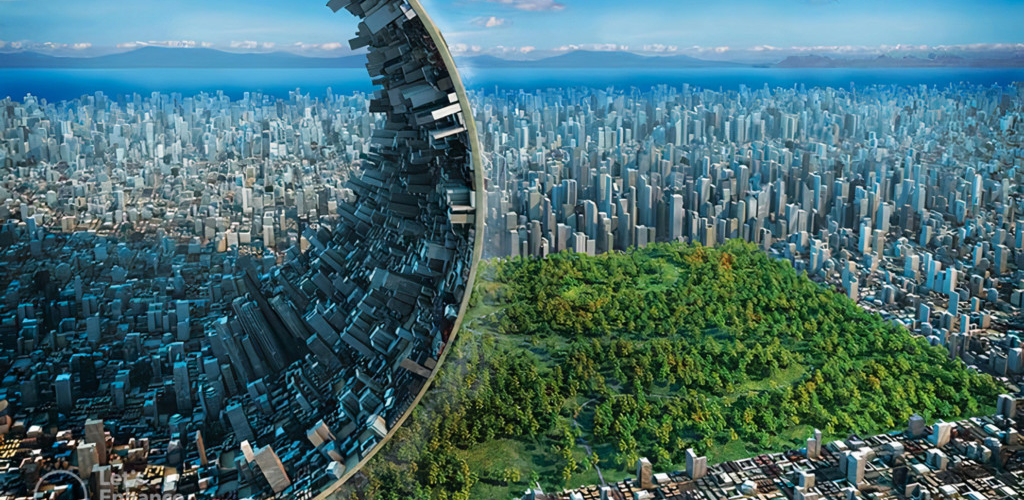
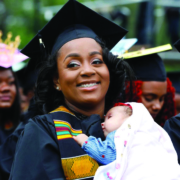
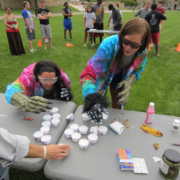
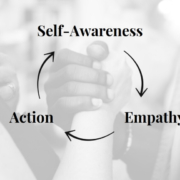 Image credit: Malte Krohn
Image credit: Malte Krohn 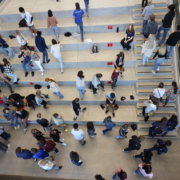 Photo credit: Doug Halvorsen
Photo credit: Doug Halvorsen 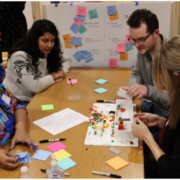 Photo Credit: Ilya Adeev
Photo Credit: Ilya Adeev 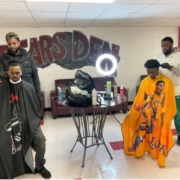

 Credit: Ariana Beraun Gasco
Credit: Ariana Beraun Gasco
Leave a Reply
Want to join the discussion?Feel free to contribute!